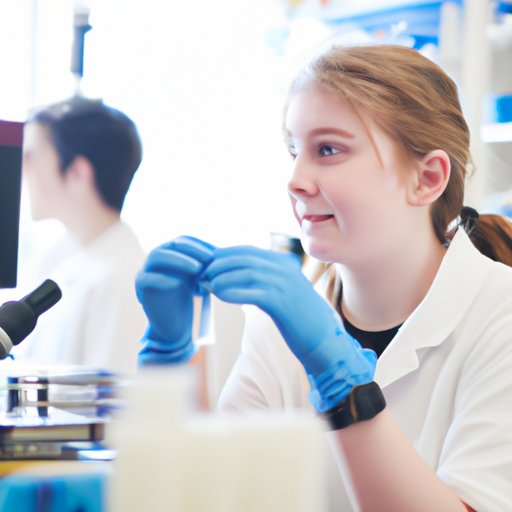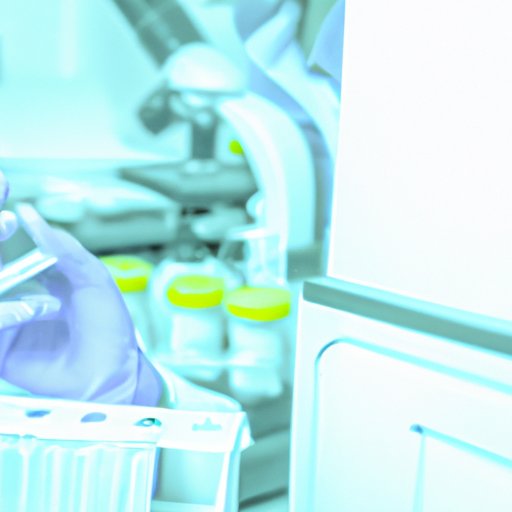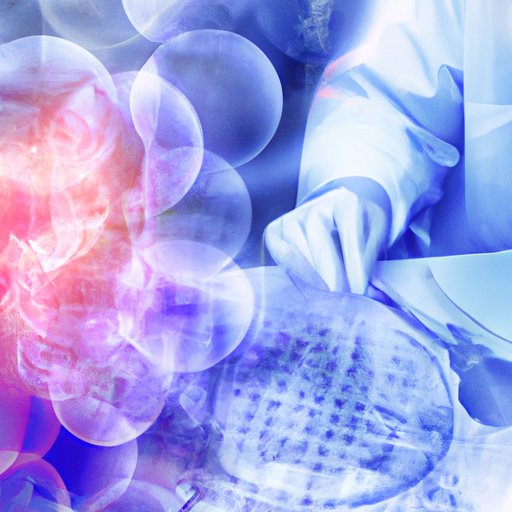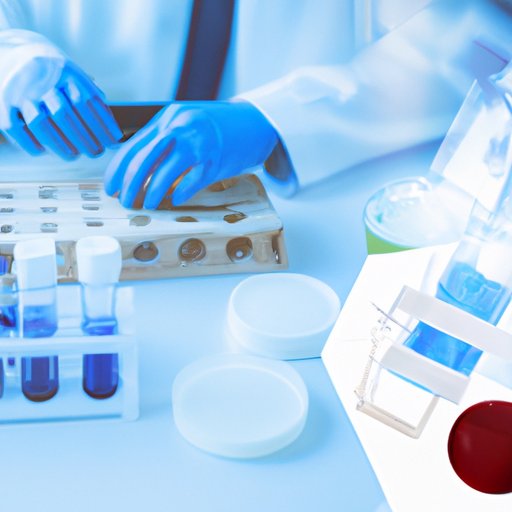Introduction
Clinical laboratory science (CLS) is a field that focuses on analyzing samples in order to diagnose, treat, and prevent diseases. CLS professionals use sophisticated equipment and techniques to identify and measure the levels of various substances in the body, such as proteins, hormones, and enzymes. Such testing is essential for medical diagnosis, treatment, and research.
Overview of Clinical Lab Science: What It Is and How It Works
Clinical lab science is the study of the chemical, physical, and biological properties of samples collected from patients. This includes analyzing specimens, such as blood, urine, and tissue, to detect any abnormalities or changes in the body. CLS professionals use a variety of tests to analyze these samples, such as microscopy, chromatography, and immunoassays.
Different Types of Clinical Lab Tests
Clinical lab tests can be divided into two categories: diagnostic tests and screening tests. Diagnostic tests are used to confirm the presence of a disease or condition. Examples include blood tests, genetic tests, and imaging tests. Screening tests, on the other hand, are used to detect potential diseases before symptoms appear. These tests include cholesterol tests, Pap smears, and mammograms.
How Clinical Lab Tests Work
Clinical lab tests work by measuring the levels of various substances in the body. For example, a blood test measures the levels of different substances, such as red and white blood cells, hormones, and enzymes. By examining these levels, a doctor can determine if there is a problem with the patient’s health.
The Role of Clinical Lab Scientists
Clinical lab scientists are responsible for performing and interpreting lab tests. They are also responsible for maintaining laboratory equipment and ensuring that the results of tests are accurate. Clinical lab scientists are highly trained professionals who must possess a thorough knowledge of laboratory techniques, safety protocols, and quality control procedures.

Exploring Careers in Clinical Laboratory Science
Clinical laboratory science is a growing field with many career opportunities. According to the Bureau of Labor Statistics, employment of medical and clinical laboratory technologists and technicians is projected to grow 13 percent from 2019 to 2029, much faster than the average for all occupations.
Job Outlook for Clinical Lab Scientists
Job growth for clinical lab scientists is expected to remain strong due to advances in medical technology and an aging population. As technology continues to improve, more complex tests will become available, which will require more trained professionals to perform them. In addition, the need for clinical lab scientists is expected to increase as more people seek preventive care and early detection of diseases.
Salary Range for Clinical Lab Scientists
According to the Bureau of Labor Statistics, the median annual wage for medical and clinical laboratory technologists was $53,120 in May 2019. The lowest 10 percent earned less than $35,750, and the highest 10 percent earned more than $83,770. Clinical laboratory technicians earned a median annual wage of $51,770 in May 2019.

The Role of Clinical Lab Science in Medical Diagnosis
Clinical lab tests play a critical role in medical diagnosis. They help doctors identify certain diseases and conditions, as well as monitor the progress of a patient’s treatment. Clinical lab tests can also provide valuable information about a patient’s overall health, such as cholesterol and glucose levels.
The Importance of Accurate Test Results
Accurate test results are essential for making informed decisions about a patient’s health. A wrong diagnosis can lead to improper treatment, which can have serious consequences for a patient’s health. Therefore, it is important for clinical lab scientists to ensure that their tests are accurate and reliable.
Clinical Lab Tests Used to Diagnose Diseases
Clinical lab tests can be used to diagnose a wide range of diseases, including cancer, diabetes, heart disease, and infectious diseases. Tests used to diagnose diseases include blood tests, urine tests, and imaging tests. Depending on the type of disease being tested for, the doctor may order additional tests to confirm or rule out a diagnosis.
Examining the Educational Requirements for Becoming a Clinical Lab Scientist
Becoming a clinical lab scientist requires a significant amount of education and training. Most positions require at least a bachelor’s degree in a related field, such as biology, chemistry, or medical technology. Some states also require clinical lab scientists to be certified by the Board of Registry of Clinical Laboratory Personnel.
Degrees and Certifications Needed
In order to become a clinical lab scientist, individuals must obtain a bachelor’s degree in a related field, such as biology, chemistry, or medical technology. In addition, some states require clinical lab scientists to be certified by the Board of Registry of Clinical Laboratory Personnel. Certification requires passing a written examination and completing a minimum number of hours of supervised practical experience.
Courses Needed to Become a Clinical Lab Scientist
Individuals interested in becoming a clinical lab scientist should take courses in biology, chemistry, pathology, immunology, and medical ethics. Additional courses may be required depending on the state in which they wish to practice. After completing the necessary coursework, individuals must pass an exam to be eligible for certification.

Understanding the Impact of Clinical Lab Science on Patient Care
Clinical lab science has a profound impact on patient care. Clinical lab tests help diagnose diseases and monitor the effectiveness of treatments. Additionally, clinical lab tests can provide valuable information about a patient’s overall health, helping doctors make informed decisions about a patient’s care.
What Clinical Lab Science Can Do For Patients
Clinical lab science can provide valuable insight into a patient’s health. Through clinical lab tests, doctors can diagnose diseases, monitor treatments, and detect potential health problems. Additionally, clinical lab tests can provide information about a patient’s nutritional status and risk factors for certain diseases.
The Benefits of Clinical Lab Tests
Clinical lab tests offer numerous benefits for patients. They can help diagnose diseases quickly and accurately, allowing doctors to begin treatment sooner. Furthermore, clinical lab tests can provide valuable information about a patient’s overall health, allowing doctors to develop personalized treatment plans.
Conclusion
Clinical lab science plays a vital role in medical diagnosis, treatment, and research. Clinical lab scientists are highly trained professionals who use sophisticated equipment and techniques to analyze samples and detect abnormalities or changes in the body. Careers in CLS are expected to grow due to advances in medical technology and an aging population. To become a clinical lab scientist, individuals must obtain at least a bachelor’s degree in a related field and pass an exam to be eligible for certification. Clinical lab tests can provide valuable insight into a patient’s health, helping doctors make informed decisions about a patient’s care.
Clinical lab science is an important field that is essential for providing quality healthcare. It is a rapidly growing field with many career opportunities and offers the opportunity to make a lasting impact on patient care.
(Note: Is this article not meeting your expectations? Do you have knowledge or insights to share? Unlock new opportunities and expand your reach by joining our authors team. Click Registration to join us and share your expertise with our readers.)
